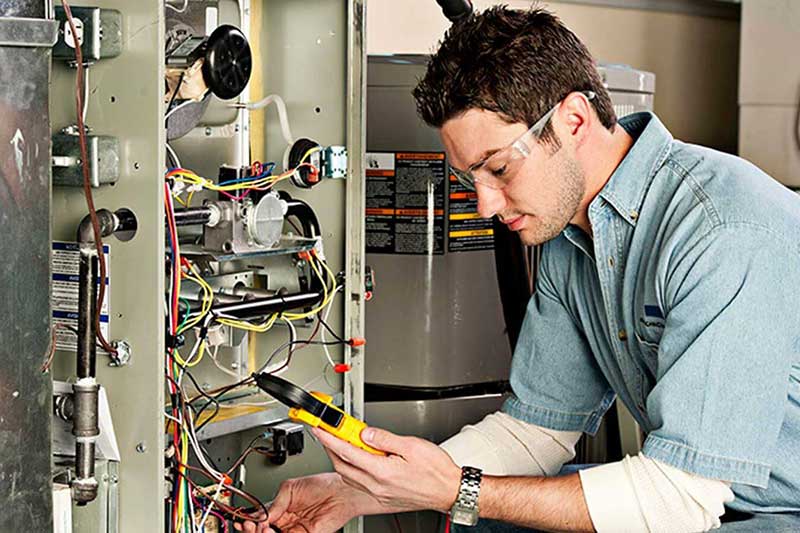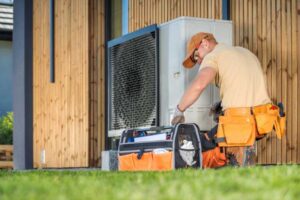Ready to start a new career? If you are interested in learning a new trade, then becoming an HVAC technician through a trade school program is an easy way to start. Heating, ventilation, and air conditioning technicians have access to a growing, diverse industry rich with different job opportunities. So, “What does an HVAC technician do?”
What Does an HVAC Technician Do: Roles & Responsibilities
HVAC technicians diagnose, install, and service heating, ventilation, air conditioning, and refrigeration equipment. Now commonly known as HVAC/R professionals, these technicians are leaders in the latest HVAC standards and technologies.
Every day is different for an HVAC technician. On the first day, you may oversee the installation of a new air conditioner, and on the next, you could perform multiple tune-ups as homeowners prepare for the coming season. If you work in a commercial building or industrial property, your job may involve monitoring, maintaining, and optimizing systems for health, safety, and energy efficiency.
In addition:
The best part about being an HVAC technician is the ability to build your career to suit your preferences. Some HVAC professionals specialize in a particular area, like heating, or decide to open their own business or work as independent contractors.
Where Do HVAC Technicians Work?
You’ll find HVAC technicians just about everywhere. HVAC technicians can work in many environments, from driving to various residences to working on-site at a hospital or airport. You can even look for construction or industrial HVAC jobs if that better suits you. While residential and commercial HVAC technicians may move to different locations for work, some are permanent staff members at a particular company.
How Do You Become an HVAC Technician?
The first step toward a rewarding HVAC career is earning your diploma through trade school. An HVAC training program will teach you what you need to know about heating, ventilation, and air conditioning to earn your state license.
Through a trade school, you learn the fundamentals of HVAC and what you need to pass the licensing and EPA 608 certification exams. The EPA 608 certification standardizes the management and disposal of refrigerants according to the Clean Air Act. All HVAC technicians must pass this exam to know how to safely work with, dispose of, and maintain refrigerant-based systems.
What Do You Learn During an HVAC Technician Program?
Every day at trade school teaches you something new, and you only learn what you need to perform well in your future careers. Without any “filler” electives, you can rest assured that the education you receive will only be relevant to your field and give you the foundation necessary to become a skilled professional. Look at some of the material you will learn in an HVAC technician program.
Basic Electricity
How does AC differ from DC currents? How can you optimize a home’s central HVAC system to use less power? How do you calculate a machine’s electrical load to effectively heat and cool a room? Your basic electrical training course will answer all these questions and more. You’ll learn the fundamentals of electrical science, how electricity affects HVAC systems, and how to work safely with electrical components on the job.
Safety and Shop Practices
Working with such intricate machinery requires safety protocol. In addition to keeping yourself out of harm’s way, knowing how to operate HVAC systems and tools safely will ensure you also make systems safe for others. Through several lab exercises, you’ll work hands-on with different types of HVAC equipment and tools to learn the safest way to handle any job.
Safety and Shop Practices
Working with such intricate machinery requires safety protocol. In addition to keeping yourself out of harm’s way, knowing how to operate HVAC systems and tools safely will ensure you also make systems safe for others. Through several lab exercises, you’ll work hands-on with different types of HVAC equipment and tools to learn the safest way to handle any job.
Basic Refrigeration
Students in this training portion learn refrigeration and how it works to cool air. Refrigeration systems can extend beyond traditional heaters and air conditioners to supermarket and laboratory refrigerators. You’ll learn the basic scientific principles behind refrigeration and heat transference and how to apply this knowledge to make informed troubleshooting decisions at work.
Brazing, Soldering and Piping
An HVAC technician must know different metal-joining techniques to perform their jobs, especially when making large repairs or installing new HVAC equipment. You will learn how to braze, solder, and assemble different forms of piping commonly used throughout the industry. You will learn how and when to use each process and how to select and operate the right tools for the job.
Sheet Metal Fabrication
Sheet metal is used to line ducts. The manufacturing process includes cutting, bending, and attaching different types of sheet metal to line ductwork in homes and businesses. While most HVAC technicians will work with existing sheet metal, you may rely more on the fabrication process if you are interested in working HVAC construction jobs.
Duct Systems
The duct system delivers heated and cooled air throughout a home. You understand how ductwork will influence your repairs, modifications, and upgrades to various HVAC systems. In some cases, you may make repairs to ductless systems, like a ductless mini-split AC. Duct systems can also require maintenance, cleaning, paneling, and loosening, and all fall into an HVAC technician’s wheelhouse.
Heating and Air Conditioning
You will spend most of your studies learning how different types of HVAC equipment perform various heating and air conditioning functions. In addition to the science behind heating and air conditioning, you will also get to work with different types of equipment to make repairs, install new parts, and gain an in-depth understanding of the system.
Commercial HVAC
Commercial HVAC technicians service retail stores, gyms, medical clinics, restaurants, and other public buildings. They can also repair large-scale HVAC systems in office buildings and other facilities. Commercial HVAC systems are increasingly complex and demand specialized training and understanding.
Commercial Refrigeration
Commercial refrigeration can also become an HVAC technician’s specialty; you may operate exclusively with refrigeration systems in grocery stores, food service businesses, and factories. However, you may also need to know how to work with commercial refrigeration systems to make routine job calls.
What Are the Benefits of Attending an HVAC Program?
There are many reasons students choose to attend trade school for HVAC rather than work an apprenticeship. HVAC trade school is designed to give you all the education and support you need to enter the field confidently. Here are some of the benefits you can expect by attending an HVAC trade school program.
1. Complete Curriculum
You can learn what you need about HVAC, from the basics to advanced techniques. From diagnosing to client satisfaction, you’ll build the technical and communication skills you need to perform your job to your fullest potential. You can also confidently take your HVAC and EPA 608 Universal exams, knowing that your education covers everything you’ll encounter on the test and in the field.
2. Ample Practice Opportunity
You can learn from your mistakes, ask questions, and let curiosity guide you while practicing on real HVAC equipment. From typical residential heaters to furnaces and commercial air conditioning units, you’ll build familiarity through hands-on exercises alongside your classmates.
3. Industry-Experienced Instructors
The school’s faculty are experienced professionals who have decided to transform their passion for HVAC into a teaching career. Because they all have experience working in the field, your instructors know exactly what you need to build the right skills and become confident HVAC technicians.
4. Career Services
You won’t graduate and must figure out how to get a job yourself. Through Career Services, you get the hands-on attention your career deserves. From answering your common questions to helping you build an irresistible resume, the Career Services team is always available to help you achieve your dreams throughout your career.
Ready to Train as an HVAC Technician?
The HVAC Technician II program at ATA College has been designed to prepare you for entry-level positions as a Heating, Air Conditioning, and Refrigeration Mechanic and Installer through relevant classroom knowledge and hands-on technical skills. Learn in small classrooms or a hybrid environment, and gain hands-on experience and college credits with local employers during a five-week practical externship.





